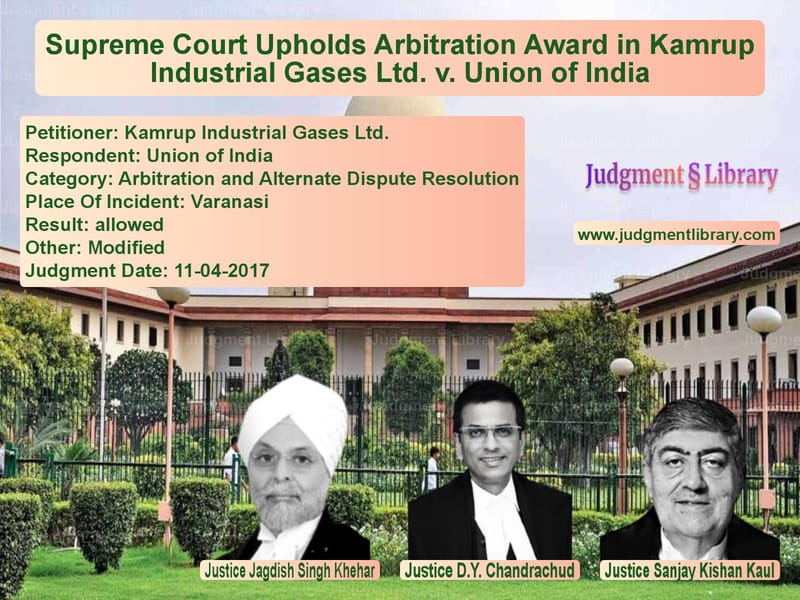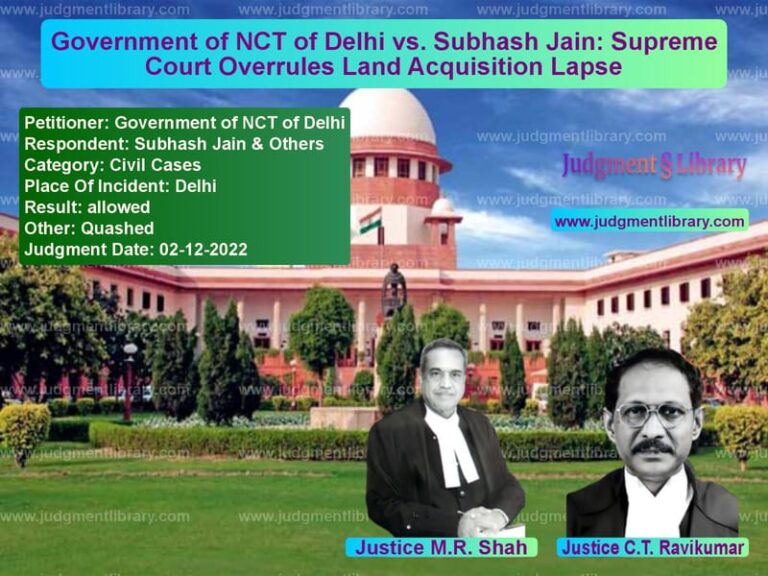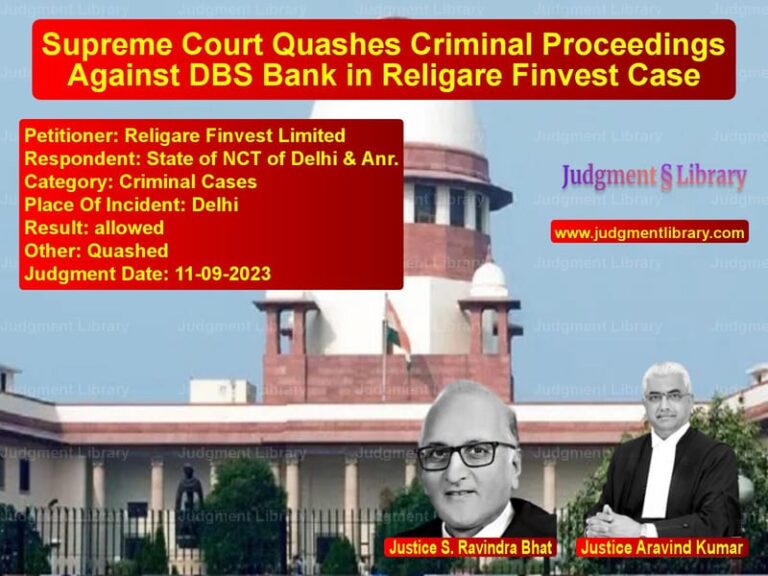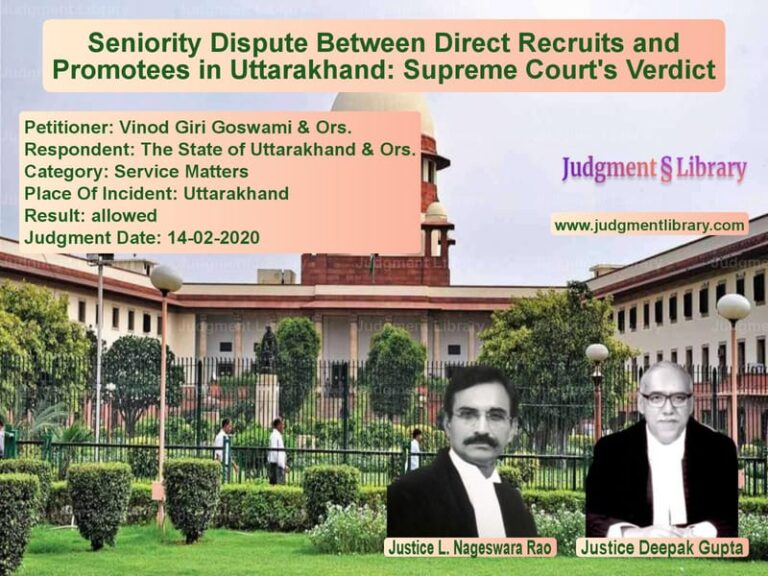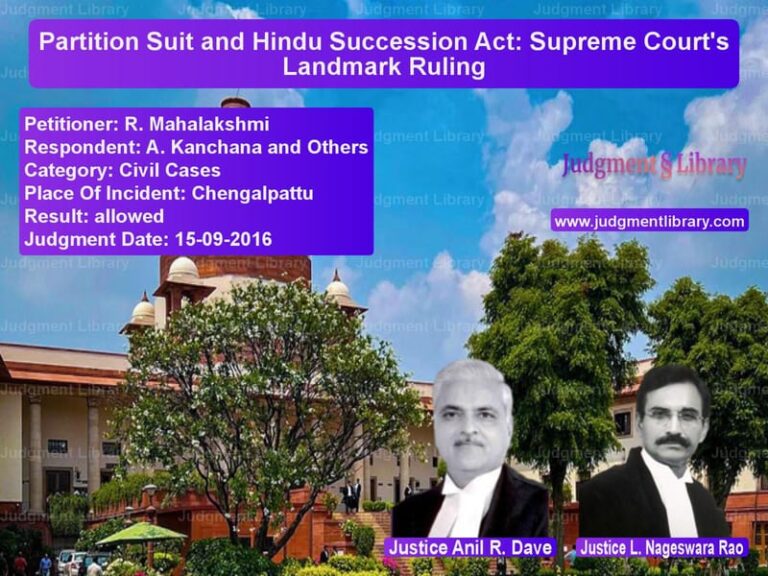Supreme Court Upholds Arbitration Award in Kamrup Industrial Gases Ltd. v. Union of India
The Supreme Court of India recently delivered a landmark judgment in Kamrup Industrial Gases Ltd. v. Union of India, settling a long-standing arbitration dispute. The case revolved around a contractual agreement between Kamrup Industrial Gases Ltd. and Diesel Locomotive Works, Varanasi for the supply of oxygen and acetylene gas. The dispute arose when Diesel Locomotive Works failed to lift the minimum agreed quantity, leading Kamrup Industrial Gases Ltd. to seek compensation.
The litigation journey spanned multiple arbitrators, High Court rulings, and finally a Supreme Court decision upholding the arbitration award.
Background of the Case
On 21.04.1965, Kamrup Industrial Gases Ltd. entered into an agreement with Diesel Locomotive Works (DLW), Varanasi, to establish a plant for manufacturing oxygen and acetylene gas. The agreement required DLW to lift a minimum quantity of:
- 18,000 cubic meters of oxygen gas per month
- 2,500 cubic meters of acetylene gas per month
The contract further stated that if DLW failed to lift the agreed quantity, it would still be liable to pay for the minimum amount. In case DLW could not lift the full amount, Kamrup Industrial Gases Ltd. was permitted to sell the balance in the open market. If unsold, the company had the liberty to empty its cylinders and claim compensation.
Petitioner’s Argument
Kamrup Industrial Gases Ltd. sought arbitration, claiming:
- DLW did not lift the minimum agreed quantity, thereby breaching the contract.
- The company suffered financial losses and was entitled to compensation.
- The arbitration award should be upheld as it correctly interpreted the contract.
- DLW was duly notified before the unlifted gas was blown off, ensuring compliance with contract terms.
Respondent’s Argument
DLW (Union of India) countered the claim, arguing:
- The company had not provided sufficient proof of the unsold gas being blown off.
- DLW was not given proper notice before Kamrup Industrial Gases Ltd. disposed of the excess gas.
- The arbitration process was flawed as crucial documents were not produced before the arbitrator.
Arbitration Award
The matter was initially adjudicated by arbitration, which lasted from 1982 to 2004. The final award was issued on 18.04.2004. The key findings were:
- Kamrup Industrial Gases Ltd. was entitled to Rs. 8,72,235.16 for non-lifting of gas.
- Additional compensation of Rs. 3,23,581.59 for interest on unpaid bills up to 15.11.1976.
- Pendente lite interest at 3% per annum from 06.03.1989 until the award date.
- Post-award interest at 6% per annum until realization.
- Rs. 4,00,000 as costs of arbitration proceedings.
High Court Ruling
DLW challenged the arbitration award before the Calcutta High Court. A Single Judge upheld the award on 19.04.2005. However, DLW filed an appeal, and a Division Bench of the High Court overturned the award on 27.04.2007, stating:
- Kamrup Industrial Gases Ltd. failed to provide key documents supporting its claim.
- Documents such as production records, sales records, and financial statements were missing.
- Adverse inference was drawn due to non-production of evidence.
Aggrieved by the decision, Kamrup Industrial Gases Ltd. approached the Supreme Court.
Supreme Court’s Observations
The Supreme Court, led by Chief Justice Jagdish Singh Khehar, Justice D.Y. Chandrachud, and Justice Sanjay Kishan Kaul, found that the High Court erred in drawing adverse inferences. Key observations include:
“We find substance in the contention advanced at the hands of the learned counsel for the appellant, more particularly because learned counsel for the respondent could not dispute the factual position recorded in the proceedings conducted before the Arbitrator.”
The Court examined the arbitration records and found:
- The required documents were submitted before the arbitrator on 16.08.1989.
- DLW’s legal counsel had received copies of these documents.
- Witnesses testified about the notification of unlifted gas disposal.
- DLW failed to rebut the claims effectively.
Judgment
The Supreme Court set aside the High Court’s ruling and upheld the arbitration award, stating:
- The arbitrator’s findings were based on legally admissible evidence.
- The award was fair and justified.
- DLW was liable to compensate Kamrup Industrial Gases Ltd. as per the contract terms.
- Post-decretal interest of 9% per annum was granted from 01.09.2006.
Implications of the Judgment
This ruling has significant implications for arbitration and contract law in India:
- Finality of Arbitration Awards: The Supreme Court reinforced that courts should not interfere with well-reasoned arbitration awards.
- Burden of Proof: Adverse inferences cannot be drawn without substantial proof of non-compliance.
- Contractual Obligations: Parties must adhere to contractual commitments, especially in commercial agreements.
- Post-Award Interest: The ruling emphasizes that delays in implementing arbitration awards will attract post-decretal interest.
This judgment strengthens arbitration in India and ensures that contractual obligations are honored fairly.
Don’t miss out on the full details! Download the complete judgment in PDF format below and gain valuable insights instantly!
Download Judgment: Kamrup Industrial Ga vs Union of India Supreme Court of India Judgment Dated 11-04-2017.pdf
Direct Downlaod Judgment: Direct downlaod this Judgment
See all petitions in Arbitration Awards
See all petitions in Contract Disputes
See all petitions in Dispute Resolution Mechanisms
See all petitions in Judgment by Jagdish Singh Khehar
See all petitions in Judgment by Dhananjaya Y Chandrachud
See all petitions in Judgment by Sanjay Kishan Kaul
See all petitions in allowed
See all petitions in Modified
See all petitions in supreme court of India judgments April 2017
See all petitions in 2017 judgments
See all posts in Arbitration and Alternate Dispute Resolution Category
See all allowed petitions in Arbitration and Alternate Dispute Resolution Category
See all Dismissed petitions in Arbitration and Alternate Dispute Resolution Category
See all partially allowed petitions in Arbitration and Alternate Dispute Resolution Category

